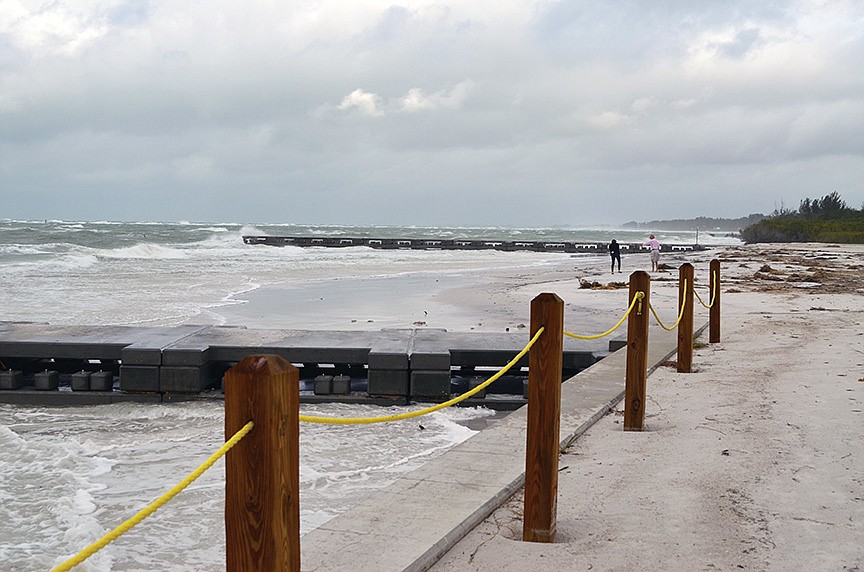- December 23, 2024
-
-
Loading

Loading

The Gulf Coast beaches: What a mess.
We’re not talking about the aftermath of Hurricane Hermine.
We’re referring to the maddening, expensive, time-consuming and excruciating bureaucratic ordeals that every Gulf Coast beach community must endure to obtain the permits from federal and state agencies to renourish and maintain their beaches.
And look at the results:
It took three years from the time the town of Longboat Key filed federal and state applications for permits to the day dredging actually began in New Pass to restore sand in front of the beach-less, property-threatened Inn on the Beach and L’Ambiance and Pierre condominiums.
Three years.
Had that process taken what it should have, those properties would not have been exposed as they were. What’s more, the dredging of New Pass and renourishing of the beach would have been completed long before Hurricane Hermine wiped away all that was done in the past two weeks.
Longboat Key taxpayer money down the drain — thanks to the bureaucratic inertia at the U.S. Fish and Wildlife Service, and to a lesser degree, the state of Florida.
Indeed, if you talk to public works and higher officials in this region about the permitting process of beach renourishment, they will tell you — in our words — it’s ridiculous.
Consider the coastline from Anna Maria down to Boca Grande. That’s about 70 miles of beachfront — all of it constantly being eroded and needing major renourishments. And we know, historically, beach renourishments typically are necessary at least every five to seven years — like clock work. Sometimes they are more frequent, when the Hermines and Charleys come blowing through the coastlines.
But each time any municipality or county government attempts routine beach maintenance, the permitting process is interminable. As one official told us: First, the feds were all about the turtles. Now they hold up the permits for the shoreline birds.
When the local municipalities press the Fish and Wildlife chieftains on why the review process takes so long, the answers are standard government issue: Blame someone else, don’t take responsibility. The Fish and Wildlife officials say Congress isn’t funding enough employees to handle the work load. Excuses.
There must be a better way. There is a better way. When you consider the millions upon millions of taxpayer dollars invested in beach maintenance along the entire Gulf Coast (not to mention nationwide), and the frequency with which these projects occur, the permitting process can be and should be the least of the expense.
We have advocated before and will continue to advocate that this issue is crucial and expensive enough (property and taxpayer money are at risk) that the congressional representatives for this side of the state; state senators and representatives; officials from the governor’s office and permitting agencies; and representatives of the affected communities need to conduct a summit that brings an end to this costly, wasteful and frustrating process.
Fiscal conservative
Happy days are here again for most Florida municipalities and counties. Thanks to rising real estate values, property-tax revenues are on the rise again.
This brings great relief to city and county commissions, city managers and county administrators. They have more money to spend. And it brings some relief — we emphasize: some relief — to taxpayers. We don’t have to listen to government officials wail and moan about not having enough money to maintain services.
Take Longboat Key, for instance. Thanks to rising real estate values Longboat Key’s assessed property value rose 5.18%, to about $5.46 billion (up 4.86% in Sarasota County and 5.98% in Manatee County). This will boost the town’s property-tax collections by $458,473, up 4.3%, over the current fiscal year.
Happy days — for the town government.
But there is also good news for Longboat taxpayers. Thanks to the management of Town Manager David Bullock, he is proposing almost a 1% decrease in the town’s millage rate and actually proposing to cut the town’s total expenditures for the year by $504,130, or 3.1%.
When was the last time you saw a city manager or county administrator actually propose spending less money than the year before when he had even more money to spend?
Worth noting: It’s not lost on us that Longboat Key property owners will be sending more money to the town in the next fiscal year than in the current year, thanks to the assessments for the installation of underground utilities. Nonetheless, it is still satisfying to see a government authority that isn’t doing what governments are great at doing: spending whatever they get.
Kudos to Bullock.